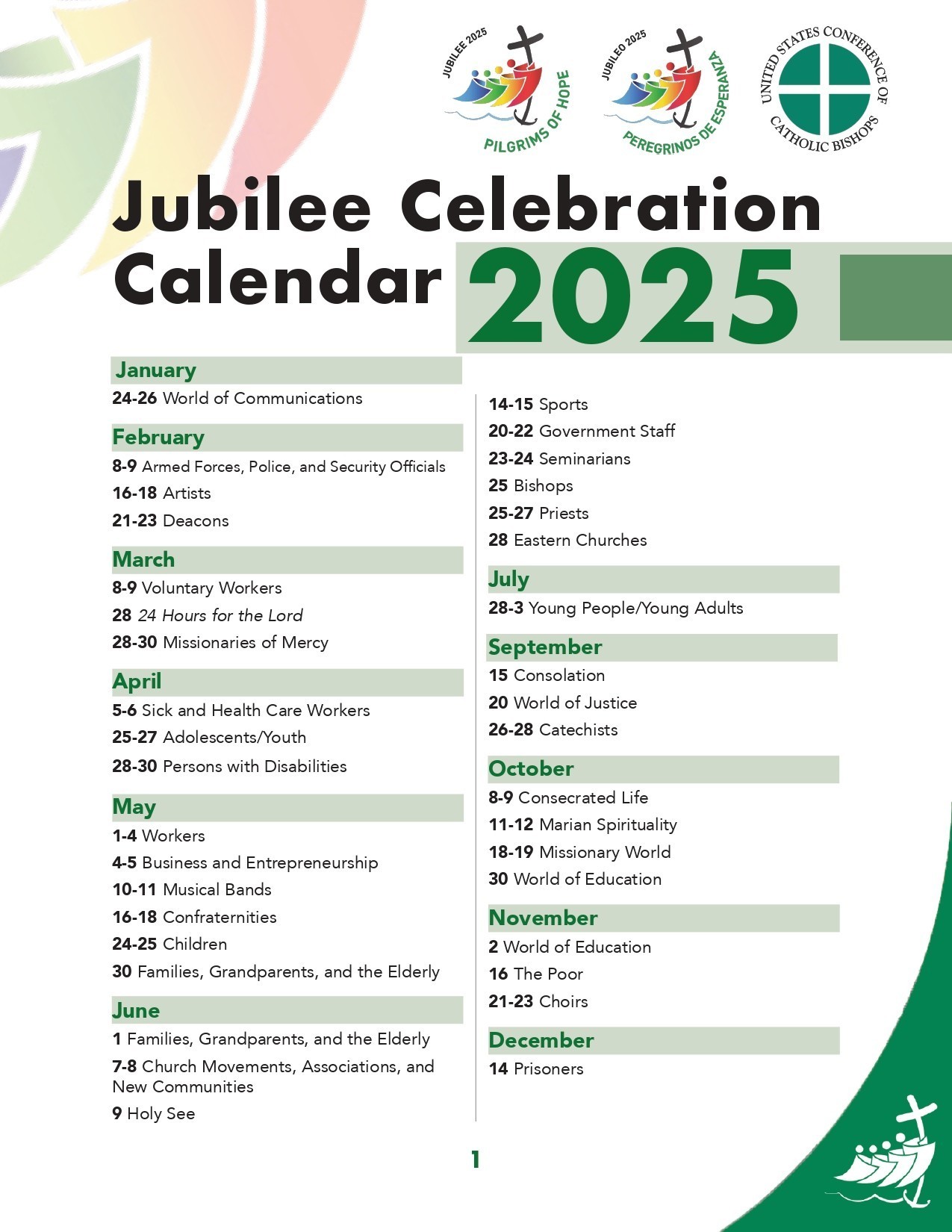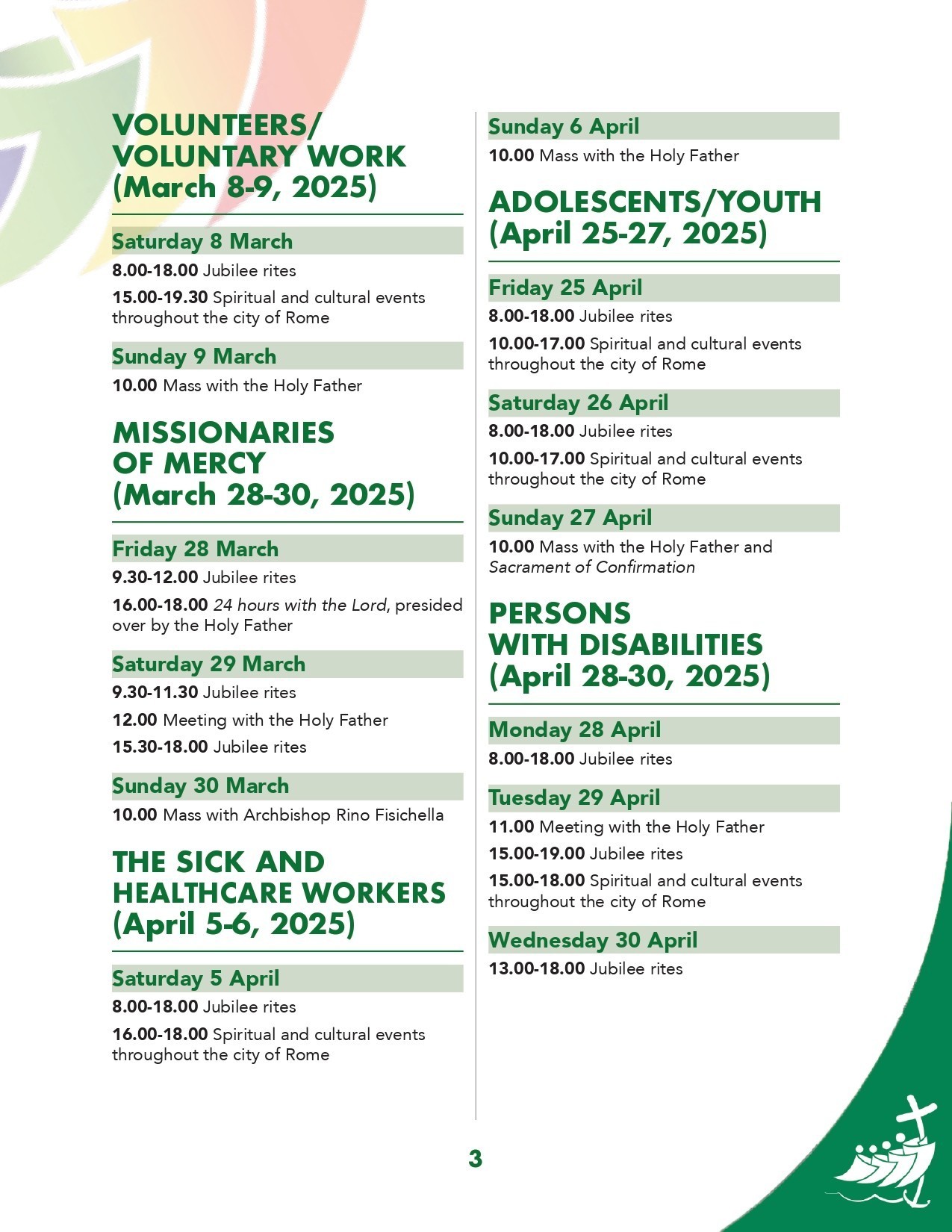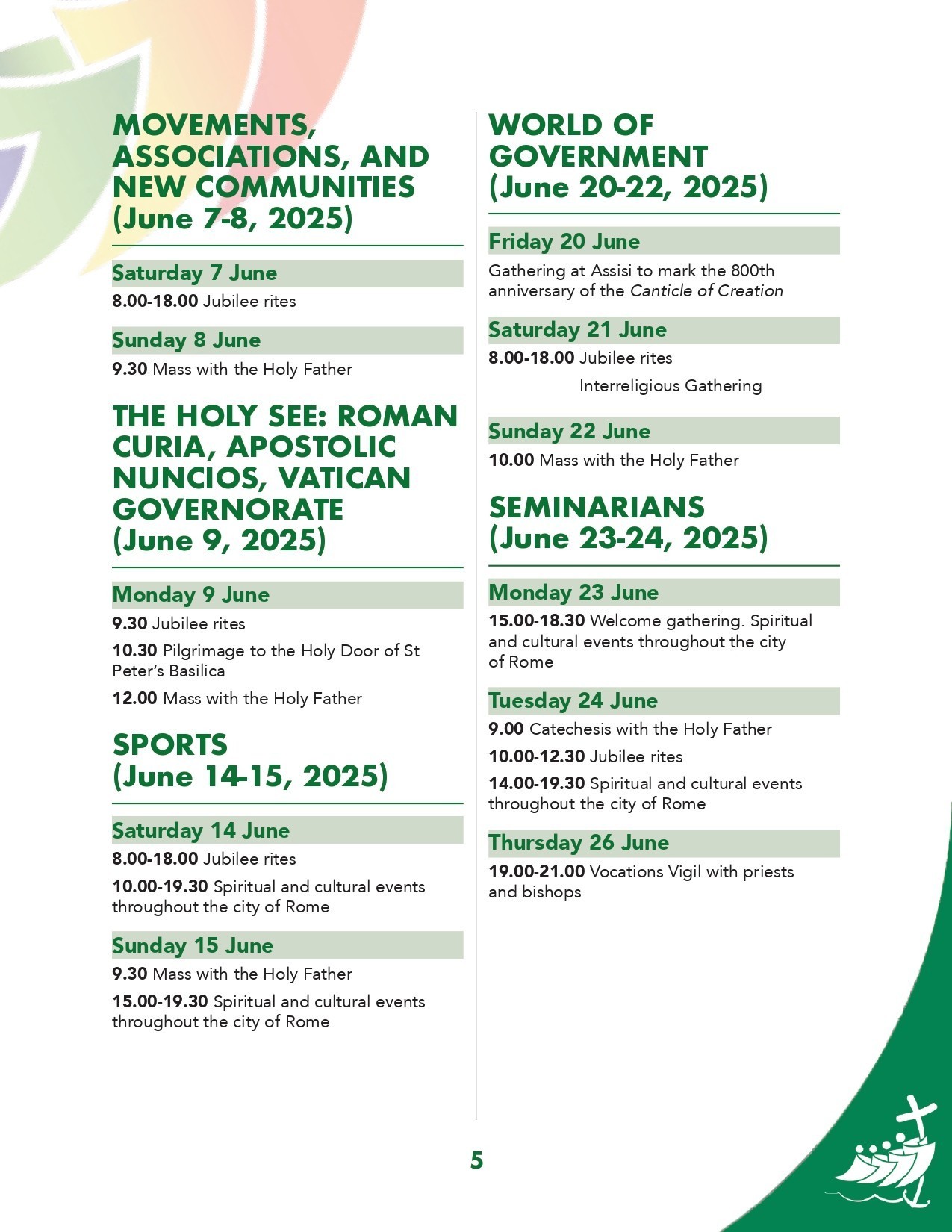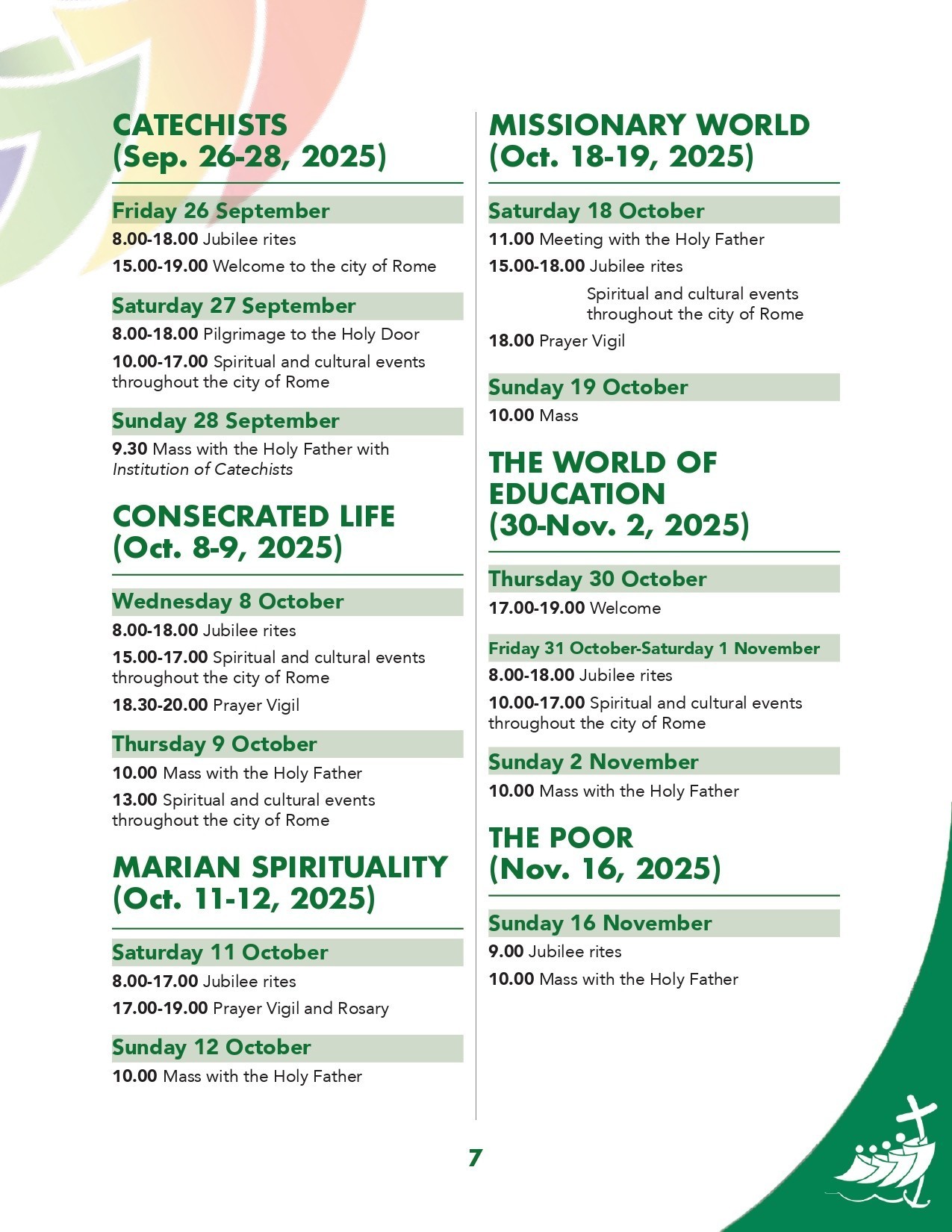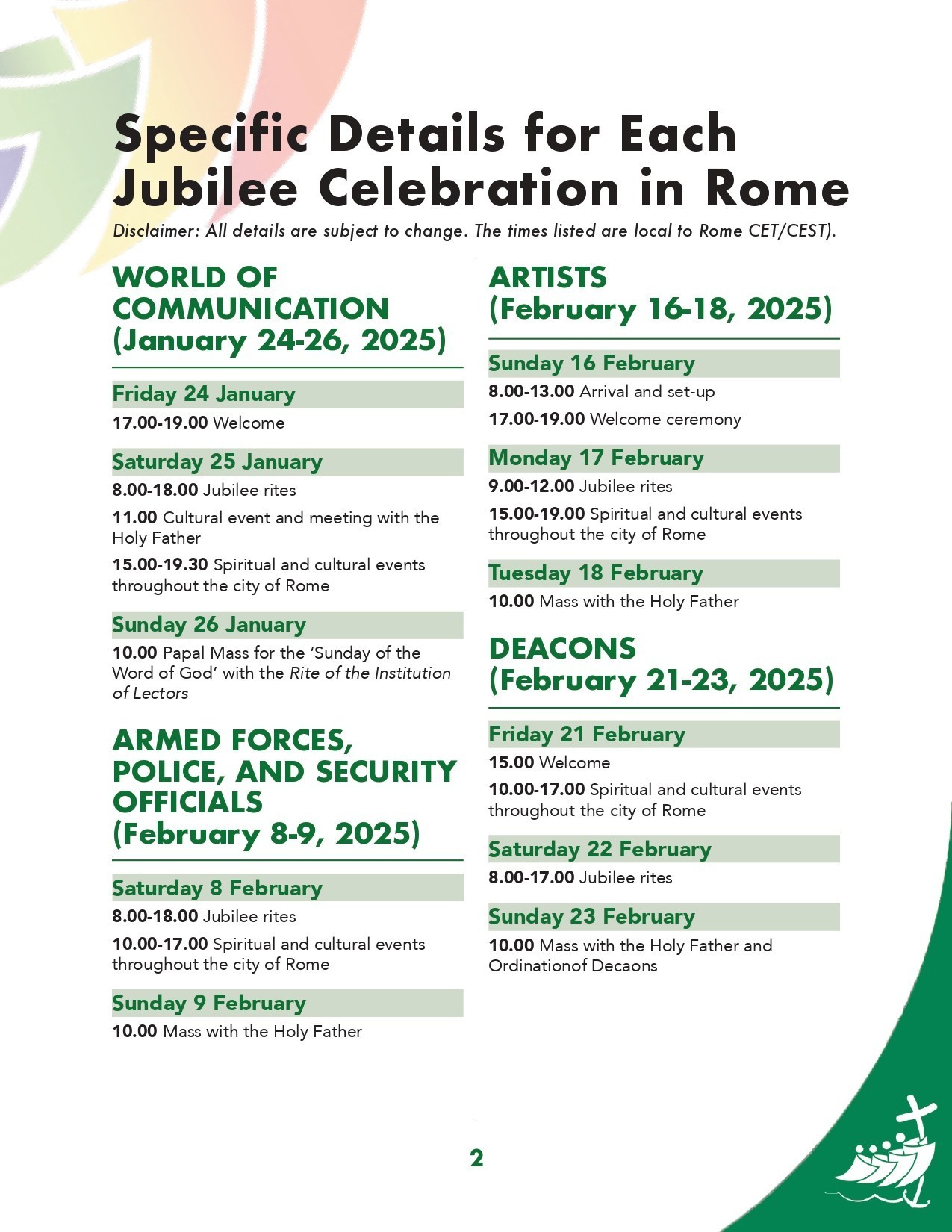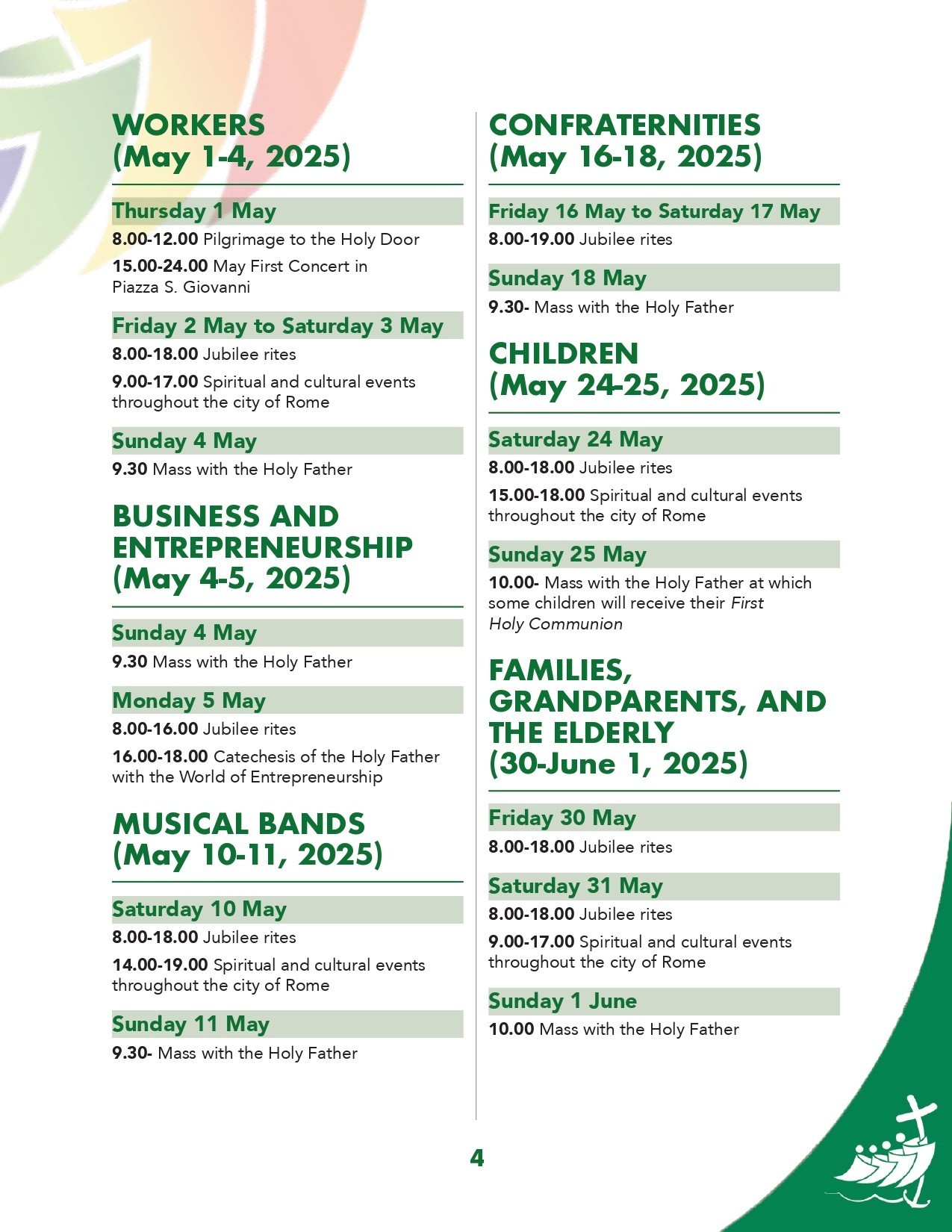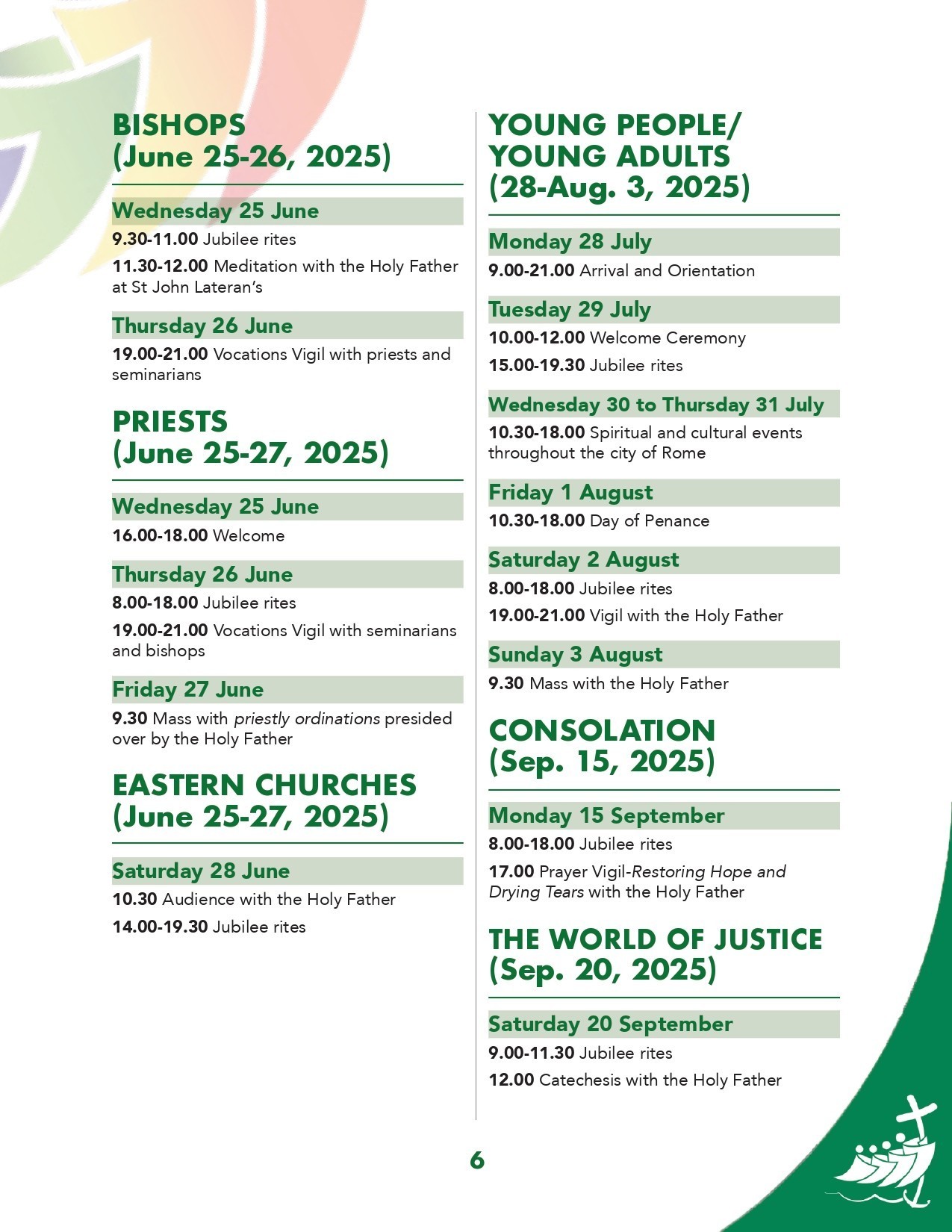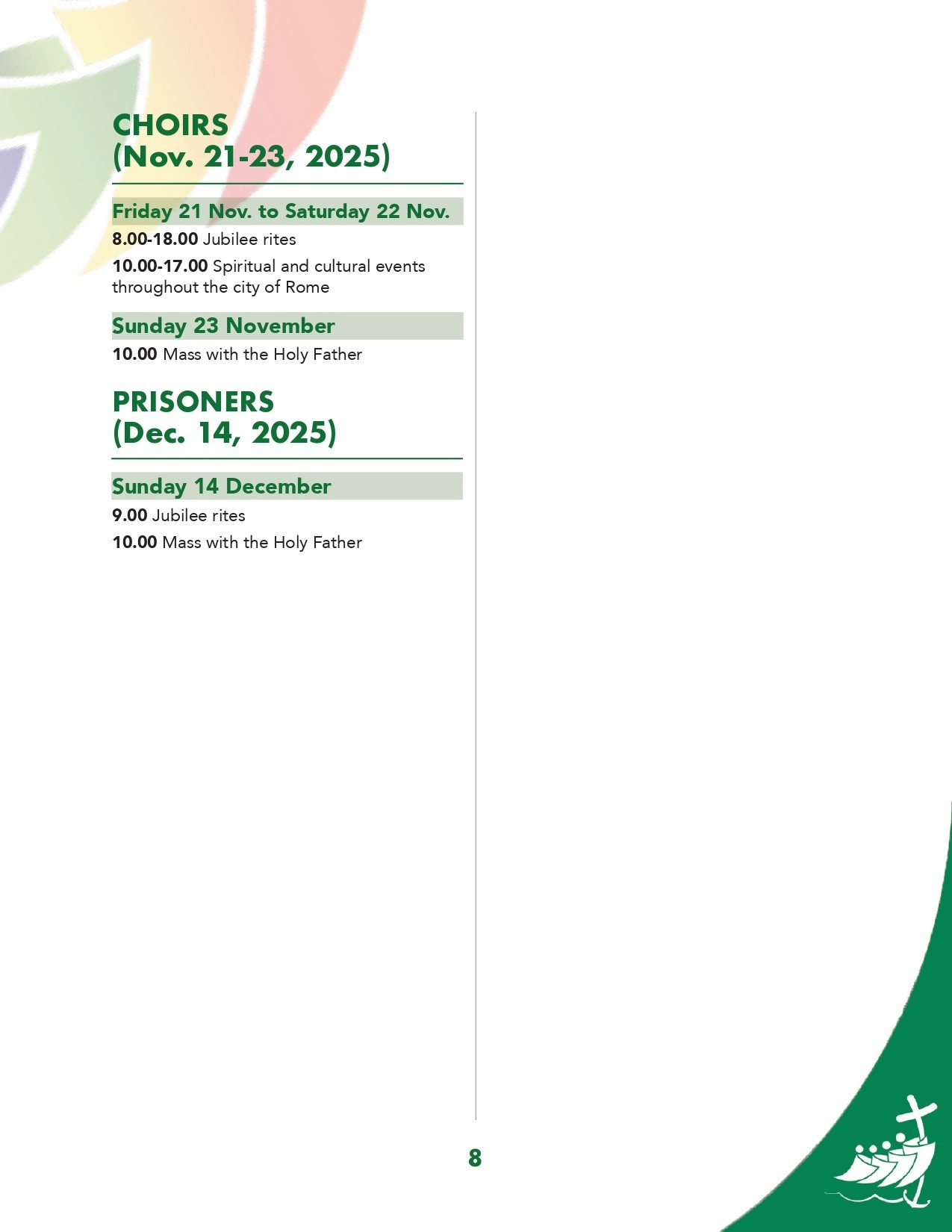
JUBILEE YEAR 2025
Bishop Bosco formally opened the 2025 Jubilee Year Pilgrims of Hope in the diocese at the 11.15am Mass at Clifton Cathedral on 29th December.
On Christmas Eve, Pope Francis opened the Holy Door of Saint Peter’s Basilica and officially inaugurated the 2025 Jubilee of Hope. During his Christmas evening Mass, he reassured the faithful that the Christ Child of Bethlehem offers the world infinite hope and joy.
With the liturgical gesture of the Door’s opening at the start of the Christmas Mass during the Night, as explained in the papal bull for the Jubilee Spes non confundit, the Pope inaugurated the Ordinary Jubilee, a historic event taking place every 25 years.
The Ordinary Jubilee will conclude with the closing of the same Holy Door on 6 January 2026, the Solemnity of the Epiphany of the Lord.
The Holy Door is deemed ‘Holy’ since it calls all those who enter through it to walk in holiness of life. In the footsteps of the Pope, during the singing of the Jubilee hymn, representatives of the entire People of God crossed its threshold, as a prelude to the countless pilgrims of hope from every country and language who will visit St. Peter’s Basilica and celebrate the mysteries of salvation during the Holy Year.
The origin of the custom goes back to Pope Martin V who, for the Extraordinary Jubilee of 1423, opened a Holy Door to enter the Lateran Basilica. In St. Peter’s, it was first used for the Jubilee of 1450.
Its location, the rear wall of the chapel dedicated by Pope John VII to the Mother of God, corresponds to a place where it is found today. Pope Alexander VI, in 1500, endowed this symbol of the opening of the Jubilee with a ritual that remained virtually unchanged over the centuries, until the turn of the millennium, when in the year 2000, the removal of the former brick wall was replaced by the ceremonial opening of the bronze Door already in 1983.
The last opening of the Holy Door for an Ordinary Jubilee was when Pope St. John Paul II had done so in the Year 2000. Pope Francis opened the Holy Door in 2015 for his 2016 Extraordinary Jubilee of Mercy.
Jubilee to strengthen faith and recognise Christ in our midst
“During the Holy Year,” the Pope has prayed, “may the light of Christian hope illumine every man and woman, as a message of God’s love addressed to all! And may the Church bear faithful witness to this message in every part of the world!”
The Holy Father invited us to pray, to prepare ourselves throughout this year, so that this Jubilee may “strengthen us in our faith, helping us to recognise the Risen Christ in the midst of our lives, transforming us into pilgrims of Christian hope.”
Restoring us to Our Father’s embrace
The Pope picked up the Jubilee theme of hope in his homily. He began recalling the Gospel passage according to St. Luke which recounts when the angel of the Lord, bathed in light, illumines the night and brings glad tidings to the shepherds: ‘I bring you good news of great joy that will be for all the people. For unto you is born this day in the city of David a Saviour, who is Christ the Lord’ (Lk 2:10-11).
At that moment, the Holy Father reflected on how Heaven breaks forth upon earth amid the wonder of the poor and the singing of angels. “God,” he highlighted, “has become one of us to make us like Himself; He has come down to us to lift us up and restore us to the embrace of the Father.”
Little Child offers hope for the world
In Emmanuel, ‘God with us,’ the Pope reiterated, we find our hope.
“The infinitely great,” he marvelled, “made Himself tiny” and “the glory of heaven appeared on earth as a little child.”
“If God can visit us, even when our hearts seem like a lowly manger,” the Pope continued, “we can truly say: Hope is not dead; hope is alive and it embraces our lives forever!”
There is hope for you
The Pope reminded that with the opening of the Holy Door, the new Jubilee was inaugurated, which exhorts each one of us to enter into the mystery of this extraordinary event.
“Tonight, the door of hope has opened wide to the world” and “God speaks to each of us and says: ‘there is hope also for you!'” he said.
“With haste,” therefore, he said, “let us set out to behold the Lord who is born for us, our hearts joyful and attentive, ready to meet him and then to bring hope to the way we live our daily lives. For Christian hope is not a ‘happy ending’ which we passively await, but rather, a promise, the Lord’s promise, to be welcomed here and now in our world of suffering and sighs.”
“With haste, let us set out to behold the Lord who is born for us, our hearts joyful and attentive, ready to meet Him and then to bring hope to the way we live our daily lives”
The end to wallowing in mediocrity
Significantly, Pope Francis underscored, the Jubilee “is a summons not to tarry, to be kept back by our old habits, or to wallow in mediocrity or laziness.”
“It is a summons not to tarry, to be kept back by our old habits, or to wallow in mediocrity or laziness”
The Pope recalled Doctor of the Church Saint Augustine’s having suggested that hope calls us to be upset with things that are wrong and to find the courage to change them.
With this in mind, as disciples of the Lord, the Holy Father encouraged, “we are called to find our greater hope in Him, and then, without delay, carry that hope with us, as pilgrims of light amid the darkness of this world.”
Rediscovering joy of encounter with the Lord
“Brothers and sisters,” the Pope reminded, “this is the Jubilee.”
“This is the season of hope in which we are invited to rediscover the joy of meeting the Lord,” he stressed, adding how the Jubilee “calls us to spiritual renewal and commits us to the transformation of our world, so that this year may truly become a time of jubilation.”
Pope Francis concluded by offering some food for thought.
“Dear sister, dear brother, on this night the ‘holy door’ of God’s heart lies open before you. Jesus, God-with-us, is born for you, for us, for every man and woman. With him, joy flourishes; with Him, life changes; with Him, hope does not disappoint.”
“Dear sister, dear brother, on this night the ‘holy door’ of God’s heart lies open before you.”
Opening of Holy Doors
On Christmas Day, Pope Francis will deliver his Urbi et Orbi message to the people of the city of Rome and the world from the central loggia of St. Peter’s Basilica at noon.
On 26 December, for the first time in the Jubilee tradition, Pope Francis will open a fifth sacred portal in a Roman prison, a gesture of hope that shows his ongoing closeness to detainees.
On Sunday, 29 December, the Pope will open the Holy Door of his cathedral, Saint John Lateran, which on 9 November this year celebrated the 1700th anniversary of its dedication.
Then, on 1 January 2025, the Solemnity of Mary, Mother of God, the Holy Door of the Papal Basilica of Saint Mary Major will be opened.
Lastly, Sunday, 5 January 2025, will mark the opening of the Holy Door of the Papal Basilica of Saint Paul Outside the Walls.
These last three Holy Doors will be closed on Sunday, 28 December 2025.
POPE FRANCIS
Letter of the Holy Father Francis for the Promotion of the New Evangelisation for the Jubilee 2025.
To My Dear Brother
the Most Reverend Rino Fisichella,
president of the Pontifical Council for the Promotion of the New Evangelisation
The Jubilee has always been an event of great spiritual, ecclesial, and social significance in the life of the Church. Ever since 1300, when Boniface VIII instituted the first Holy Year – initially celebrated every hundred years, then, following its biblical precedent, every fifty years, and finally every twenty-five years – God’s holy and faithful people has experienced this celebration as a special gift of grace, characterized by the forgiveness of sins and in particular by the indulgence, which is a full expression of the mercy of God. The faithful, frequently at the conclusion of a lengthy pilgrimage, draw from the spiritual treasury of the Church by passing through the Holy Door and venerating the relics of the Apostles Peter and Paul preserved in Roman basilicas. Down the centuries, millions upon millions of pilgrims have journeyed to these sacred places, bearing living witness to the faith professed in every age.
The Great Jubilee of the year 2000 ushered the Church into the third millennium of her history. Saint John Paul II had long awaited and greatly looked forward to that event, in the hope that all Christians, putting behind their historical divisions, could celebrate together the two thousandth anniversary of the birth of Jesus Christ, the Saviour of humanity. Now, as the first twenty-five years of the new century draw to a close, we are called to enter into a season of preparation that can enable the Christian people to experience the Holy Year in all its pastoral richness. A significant step on this journey was already taken with the celebration of the Extraordinary Jubilee of Mercy, which allowed us to appreciate anew all the power and tenderness of the Father’s merciful love, in order to become, in our turn, its witnesses.
In the last two years, not a single country has been unaffected by the sudden outbreak of an epidemic that made us experience first-hand not only the tragedy of dying alone, but also the uncertainty and fleetingness of existence, and in doing so, has changed our very way of life. Together with all our brothers and sisters, we Christians endured those hardships and limitations. Our churches remained closed, as did our schools, factories, offices, shops, and venues for recreation. All of us saw certain freedoms curtailed, while the pandemic generated feelings not only of grief, but also, at times, of doubt, fear and disorientation. The scientific community quickly developed an initial remedy that is gradually permitting us to resume our daily lives. We are fully confident that the epidemic will be overcome and that the world will return to its usual pattern of personal relationships and social life. This will happen more readily to the extent that we can demonstrate effective solidarity, so that our neighbours most in need will not be neglected, and that everyone can have access to scientific breakthroughs and the necessary medicines.
We must fan the flame of hope that has been given us, and help everyone to gain new strength and certainty by looking to the future with an open spirit, a trusting heart and far-sighted vision. The forthcoming Jubilee can contribute greatly to restoring a climate of hope and trust as a prelude to the renewal and rebirth that we so urgently desire; that is why I have chosen as the motto of the Jubilee, Pilgrims of Hope. This will indeed be the case if we are capable of recovering a sense of universal fraternity and refuse to turn a blind eye to the tragedy of rampant poverty that prevents millions of men, women, young people and children from living in a manner worthy of our human dignity. Here I think in particular of the many refugees forced to abandon their native lands. May the voices of the poor be heard throughout this time of preparation for the Jubilee, which is meant to restore access to the fruits of the earth to everyone. As the Bible teaches, “The sabbath of the land shall provide food for you, for yourself and for your male and female slaves and for your hired servant and the sojourner who lives with you; for your cattle also, and for the beasts that are in your land, all its yield shall be for food” (Lev 25:6-7).
The spiritual dimension of the Jubilee, which calls for conversion, should also embrace these fundamental aspects of our life in society as part of a coherent whole. In the realization that all of us are pilgrims on this earth, which the Lord has charged us to till and keep (cf. Gen 2:15), may we never fail, in the course of our sojourn, to contemplate the beauty of creation and care for our common home. It is my hope that the coming Jubilee Year will be celebrated and experienced with this intention too. Growing numbers of men and women, including many young people and children, have come to realize that care for creation is an essential expression of our faith in God and our obedience to his will.
To you, dear Brother, I entrust responsibility for finding suitable ways for the Holy Year to be planned and celebrated with deep faith, lively hope and active charity. The Dicastery charged with promoting the new evangelization can help make this season of grace a significant stimulus to the pastoral outreach of the particular Churches, both Latin and Eastern, which are called in these years to intensify their commitment to synodality. In this regard, our pilgrimage towards the Jubilee will express and confirm the shared journey that the Church is called to make, in order to be ever more fully a sign and instrument of unity in harmonious diversity. It will be important to foster a renewed awareness of the demands of the universal call to responsible participation by enhancing the charisms and ministries that the Holy Spirit never ceases to bestow for the building up of the one Church. The four Constitutions of the Second Vatican Ecumenical Council, together with the Magisterium of these recent decades, will continue to provide direction and guidance to God’s holy people, so that it can press forward in its mission of bringing the joyful proclamation of the Gospel to everyone.
As is customary, the Bull of Indiction, to be issued in due course, will contain the necessary guidelines for celebrating the Jubilee of 2025. In this time of preparation, I would greatly desire that we devote 2024, the year preceding the Jubilee event, to a great “symphony” of prayer. Prayer, above all else, to renew our desire to be in the presence of the Lord, to listen to him and to adore him. Prayer, moreover, to thank God for the many gifts of his love for us and to praise his work in creation, which summons everyone to respect it and to take concrete and responsible steps to protect it. Prayer as the expression of a single “heart and soul” (cf. Acts 4:32), which then translates into solidarity and the sharing of our daily bread. Prayer that makes it possible for every man and woman in this world to turn to the one God and to reveal to him what lies hidden in the depths of their heart. Prayer as the royal road to holiness, which enables us to be contemplative even in the midst of activity. In a word, may it be an intense year of prayer in which hearts are opened to receive the outpouring of God’s grace and to make the “Our Father,” the prayer Jesus taught us, the life programme of each of his disciples.
I ask the Blessed Virgin Mary to accompany the Church on the journey of preparation for the grace-filled event of the Jubilee, and to you and your co-workers, with gratitude, I cordially send my Blessing.
Rome, Saint John Lateran, 11 February 2022, Memorial of the Blessed Virgin Mary of Lourdes.
FRANCIS
Father in heaven,
may the faith you have given us
in your son, Jesus Christ, our brother,
and the flame of charity enkindled
in our hearts by the Holy Spirit,
reawaken in us the blessed hope
for the coming of your Kingdom.
May your grace transform us
into tireless cultivators of the seeds of the Gospel.
May those seeds transform from within both humanity and the whole cosmos
in the sure expectation
of a new heaven and a new earth,
when, with the powers of Evil vanquished,
your glory will shine eternally.
May the grace of the Jubilee
reawaken in us, Pilgrims of Hope,
a yearning for the treasures of heaven.
May that same grace spread
the joy and peace of our Redeemer
throughout the earth.
To you our God, eternally blessed,
be glory and praise for ever.
Amen
Papal Bull
Tradition dictates that each Jubilee is proclaimed through the publication of a Papal (or Pontifical) ‘Bull of Indiction’. By ‘Bull’ is meant an official document, generally written in Latin, bearing the seal of the Pope, the shape of which gives its name to the document itself.
In the past the seal was usually made of lead and bore, on the front, the image of the Holy Apostles Peter and Paul, founders of the Church of Rome, and, on the back, the name of the current Pontiff. Later an ink stamp replaced the metal seal, which, however, continued to be used for more important documents.
Each Bull is identified by its initial words. For example, Saint John Paul II proclaimed the Great Jubilee of the Year 2000 with the Bull Incarnationis Mysterium (The Mystery of the Incarnation), while Pope Francis proclaimed the Extraordinary Jubilee of Mercy (2015-2016) with the Bull Misericordiae vultus (The face of mercy).
The Bull announcing the Jubilee, which indicates the dates of the beginning and end of the Holy Year, is usually issued the previous year, coinciding with the Solemnity of the Ascension. For the 2025 Jubilee, publication was published on May 9, 2024.
